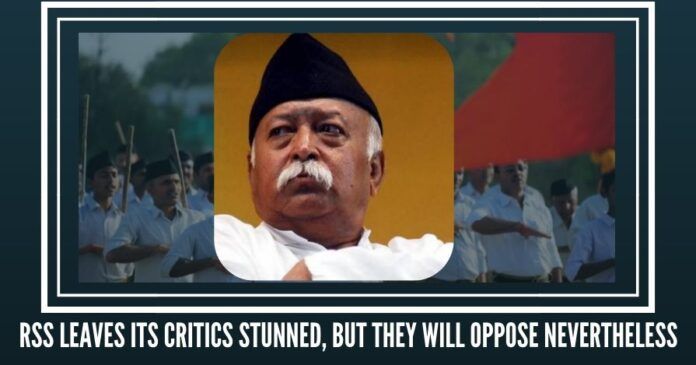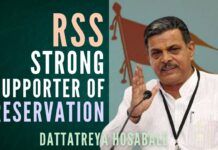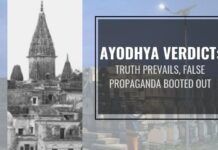
The RSS’s opinion on several contentious and contemporary issues was laid bare — and was clear as daylight for those who wished to have an open mind
RSS chief Mohan Bhagwat needs to answer this: Why did he have to go ahead and spoil the party for the Congress and the rest of the ‘secular’ establishment? It must be especially painful for them that the Sarsanghchalak should have chosen this moment, only a few months ahead of crucial Assembly elections in Madhya Pradesh, Rajasthan and Chhattisgarh, to dilute the momentum the Congress was seeking to build against the ‘hate’ philosophy of the Sangh and its affiliates, primarily the Bharatiya Janata Party which rules these three States. And why, barely seven months before the Lok Sabha elections are due, should Bhagwat have sounded so accommodative that the secularists have been reduced to fumbling for reasons to sustain their attack?
The knife was well and properly twisted on a concluding day, during the question-answer session, when Bhagwat responded to queries handed over to the event’s anchor, who then read them out
The three days, during which the RSS hosted a conclave on the subject, ‘The Future of Bharat: An RSS Perspective’, which was attended by people drawn from a variety of professions and social denominations, have been disappointing for the secular camp. To begin with, the RSS chief in his address, profusely praised the Congress for its role in the country’s freedom struggle, and said it had given India “many great personalities”. No scope for condemnation from the Sangh’s rivals; a point scored in the RSS’s favour. Then he said the country’s diversity must be “respected and celebrated”. Another point scored, without any chance of denial. Bhagwat added that the meet had been held to help people “understand” the organisation. A very democratic initiative and one additional point gained. Thus, on the first day itself of the three-day event, the secular camp was left stumped. All they could murmur was that the RSS Sarsanghchalak sounded good, but that the organisation’s actions were contrary to the homilies.
But that was only the first day. The knife was well and properly twisted on a concluding day, during the question-answer session, when Bhagwat responded to queries handed over to the event’s anchor, who then read them out. One reply stands out in particular — and while it left the secularists in a state of the tizzy, it must have taken even some of the RSS’s supporters by surprise. Responding to a question that related to the second Sarsanghchalak MS Golwalkar and his Bunch of Thoughts, in which Golwalkar is supposed to have called Indian Muslims, “enemies” (it’s not factually correct, because Golwalkar qualified the context in which he used the term), Bhagwat said that those views were not “eternal”.
The RSS chief was equally unambiguous on Articles 370 and 35A of the Constitution, both pertaining to Jammu & Kashmir. His response fell in the ‘affirmative clarity’ class when he said that the Sangh categorically opposed those provisions.
He elaborated, “Things are said due to circumstances and in a particular context. Woh shashwat nahi hain.” And added further, “We have published a book, ‘Vision and Mission: Guruji’, which contains his eternal thoughts.” This candidness in one stroke robbed the RSS’s opponents of one of the pillars on which their criticism of the organisation as being “fascist” stood. Now, the critics are on wobbly legs. The admission has not caused any embarrassment to the Sangh; instead, it has too many objective minds, helped to craft a more acceptable image of the organisation. The RSS chief didn’t deny and didn’t defend either. From now, if anyone were to accost the RSS with Golwalkar’s thoughts on Indian Muslims, they can be directed to Bhagwat’s ‘thoughts’ of September 19, 2018. End of matter.
The Q&A session proved to be useful in another sense. The RSS’s opinion on several contentious and contemporary issues was laid bare — and was clear as daylight for those who wished to have an open mind. Bhagwat’s responses can be broadly classified into two groups: affirmative clarity and consensual approach. His reply on the Ayodhya Ram temple issue falls in the first category. He made it known that the RSS wanted a grand Ram temple constructed at the disputed site; that the issue ought to have been settled a long time ago; and that a resolution of the dispute would go a big way in reducing Hindu-Muslim friction in the country. He surely reflected the viewpoint of a majority of Indians.
The RSS chief was equally unambiguous on Articles 370 and 35A of the Constitution, both pertaining to Jammu & Kashmir. His response fell in the ‘affirmative clarity’ class when he said that the Sangh categorically opposed those provisions. Perhaps it was a message to the BJP-led regime at the Centre, which has so far not stated its stand in certain terms. He was equally affirmative in expressing the RSS’s position on religious conversions — conversions through temptation or coercion cannot be condoned. Indeed, he was being lenient in saying that conversions out of genuine feelings of religion are fine; those like Mahatma Gandhi were bitterly opposed to all religious conversions, and the Dalai Lama has on many occasions also made similar remarks.
The RSS’s willingness for accommodation was evident in those of Bhagwat’s replies which can be put in the ‘consensual’ category. For instance, he said a uniform civil code can come through efforts from within society — he was obviously referring largely to the Muslim community. He was also flexible on the burning issue of reservations, deftly answering that while reservations had been necessary under the constitutional scheme of things to provide a level playing field to the marginalised sections of society, its continuance or the levels of its continuance are matters that are best left to the wisdom of the people who are stakeholders in the process. Again, this should come as a blow to the secularist camp, which has for years spread the propaganda that the RSS was against the backward classes, the Scheduled Castes and the Scheduled Tribes, because of it ‘opposed’ reservations.
The RSS’s attempt at outreach can be dismissed by its critics, some of whom, going by media reports, were invited to the event but chose to give it a miss. They neither have Mahatma Gandhi’s passion for understanding opponents nor Pranab Mukherjee’s statesmanship.
Note:
1. The views expressed here are those of the author and do not necessarily represent or reflect the views of PGurus.











Very well summarised info on happening at the conclave.